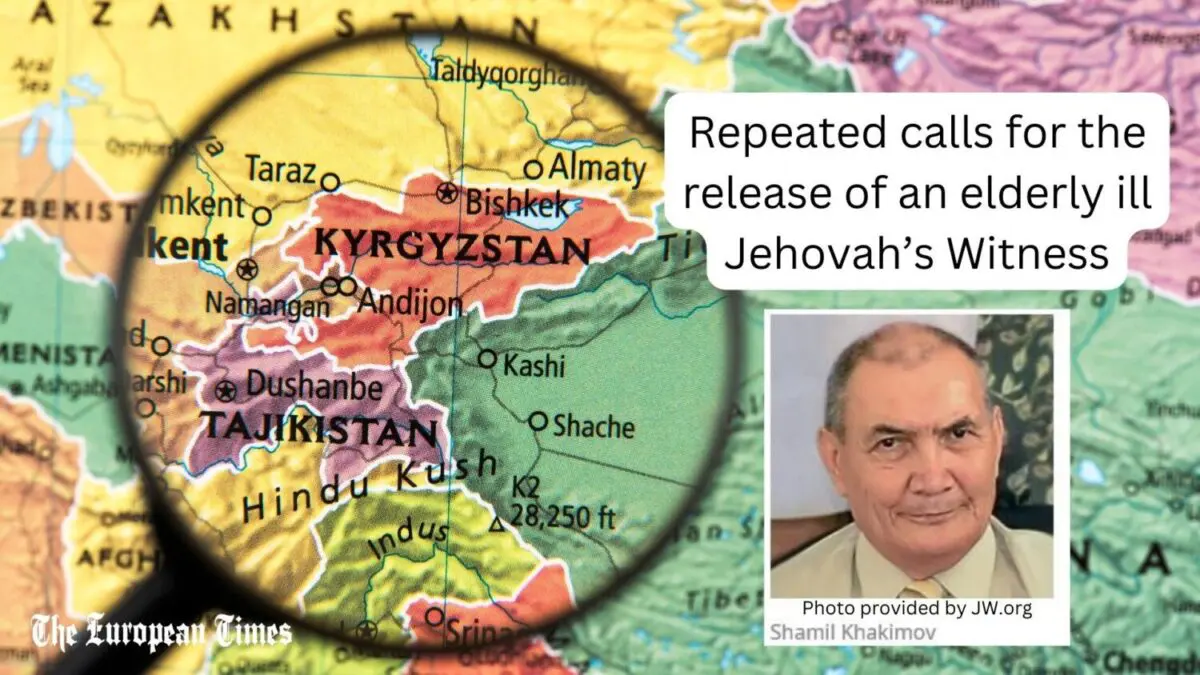TAJIKISTAN – Shamil Khakimov, a critically ill elderly Jehovah’s Witness unlawfully imprisoned for his faith in Tajikistan since February 2019, filed a formal petition for his release to the nation’s president on 8 November. The same petition was filed with the General Prosecutor’s Office, the Ministry of Justice, the Ministry of Foreign Affairs, and the Ombudsman.
On 10 November, Supervisory filed an appeal with the Supreme Court, requesting that his case be re-opened and reversed, based on 2022 judgment by the UN Human Rights Committee (CCPR) that declared Tajikistan’s ban on Jehovah’s Witnesses unlawful and baseless.
On 11 November, a private complaint/appeal was filed against the trial court decision that refused to release Shamil based on his poor health.
US Senator Rubio and the U.S. Commission on International Religious Freedom (USCIRF) called for his release as well.
State of health
During the 1990s, Khakimov developed sciatic nerve pinching and chronic sciatica. Since 2007, he has suffered from severe circulatory problems in his lower limbs, which required surgery in 2007. His condition worsened in 2017, requiring additional surgery, which was performed that year. Owing to poor vascular circulation, his surgical wounds did not heal and he had an open leg ulcer when he was arrested on 26 February 2019, and subsequently placed in pre-trial detention.
Khakimov also suffers from heart disease (left ventricular hypertrophy) and atherosclerosis of the legs and varicose veins in his lower extremities. He is at a level four risk for hypertension (blood pressure). He has undergone two operations for venectomies (blood clots) in his left leg. Complications have included the post-thrombotic syndrome in both legs, with a trophic ulcer on his left foot, and early stages of gangrene. Khakimov no longer has any vision in his right eye, and he can barely see out of his left eye due to progressive glaucoma. On 31 October 2022, he received a certificate attesting to the fact that he is now identified as having a group two disability.
Jarrod Lopes, a spokesman for Jehovah’s Witnesses, states: “If Shamil isn’t released soon and given specialized medical treatment, there is a very real danger that his imprisonment might become, effectively, a death sentence. We hope the Tajik authorities take immediate action to have Shamil released before it’s too late. There is no legal reason, according to Tajik and international law, for a peaceful elderly man like him to be in prison. He should have never been imprisoned. Additionally, in December 2020, over a year after his conviction, Tajikistan decriminalized Shamil’s so-called offence. The authorities should have immediately released him then. Instead, prison authorities continue to pressure him to ‘repent’ and renounce his beliefs. Jehovah’s Witnesses around the world hope that the Tajik authorities will soon comply with the UN Human Rights Committee’s recent judgement, by lifting the unlawful ban and releasing Shamil from prison.”
The persecution and the sentencing of Shamil Khakimov to prison
Mr Shamil Khakimov is a 71-year-old widower and pensioner. He was born in the small village of Koktush, in the district of Rudaki, Tajikistan. In 1976, he married and moved to the capital city of Dushanbe, where for 38 years he worked for OJSC Tajiktelecom as a cable lines engineer. Mr Khakimov had two children, a son and a daughter. In 1989, when his son was 12 and daughter was 7, his wife Olya died from cancer and he never remarried. Khakimov became one of Jehovah’s Witnesses in 1994. In September 2021, while Khakimov was in prison, his son died from a heart attack. He was not allowed to attend his funeral.
Due to the ban on the movement of Jehovah’s Witnesses, their members have been subjected to numerous arrests, detentions, searches, beatings, as well as a deportation.
On 4 June 2009, sixteen Jehovah’s Witnesses had a peaceful gathering in a private apartment in Khujand to read and discuss the Bible. Eleven officials, including officers of the State Committee on National Security, forced their way into the apartment, searched it and the participants of the gathering and seized their Bibles, as well as other religious publications. Several participants were subsequently brought to the headquarters of the State Committee on National Security, where they were interrogated for six hours. On an unspecified date, a criminal case was initiated against the participants of that gathering. It was dismissed in October 2009 after the OSCE Human Dimension Implementation Meeting. However, the prosecutor reopened the criminal case on other charges.
In September 2019, a court in the northern city of Khujand jailed Shamil Khakimov for seven years and six months for allegedly “inciting religious hatred”, though the sentence was subsequently twice shortened. No evidence was produced that Jehovah’s Witness Khakimov or his community had harmed anyone, and his real “crime” seems to be that the regime thinks he led Khujand’s Jehovah’s Witness community.
Registration and ban of Jehovah’s Witnesses
Jehovah’s Witnesses have been active in Tajikistan for more than 50 years. In 1994, their organization (RAJW) was granted registration by the then State Committee on Religious Affairs pursuant to the Law “On Religion and Religious Organizations” of 8 December 1990 (the “1990 Religion Law”). On 15 January 1997, the RAJW was re-registered with national status under the amendments to the 1990 Religion Law. On 11 September 2002, the State Committee on Religious Affairs suspended the activities of the RAJW for three months for door-to-door propaganda and propaganda in public places.
On 11 October 2007, the Ministry of Culture banned the RAJW, annulled its charter and determined that the RAJW’s registration of 15 January 1997 was unlawful. It concluded that the RAJW repeatedly violated the national legislation, including the Constitution of Tajikistan and the 1990 Religion Law, by distributing religious publications in public places and door-to-door, which caused discontent on the part of the population.






